-

新人教版高中英语必修3Unit 4 Space Exploration-Reading for Writing教学设计二
⑦在我看来, 探索太空是值得的。As far as I am concerned, it is worthwhile to explore the space.Step 10 Writing---draftRecently, students in our class have had heated a discussion on whether space is worth exploring. Students hold different ideas about it.30% of us think space exploration is not worthwhile. They think space is too far away from us and our daily life and is a waste of money. And the money spent on space exploration can be used to solve the earth’s problems such as starvation and pollution.On the other hand,70% think space is worth exploring because we have benefited a lot from it,such as using satellites for communication and weather forecast. What’s more,with further space research,we may solve the population problem by moving to other planets one day. Also,space research will enable us to find new sources to solve the problem of energy shortages on the earth.As far as I am concerned, it is worthwhile to explore the space. Not only can it promote the development of society but also enrich our life. Step 11 Pair workExchange drafts with a partner. Use this checklist to help your partner revise his/her draft.1.Does the writer explain why he/she changed/wanted to change?2.Does the writer tell how the changes have improved or will improve his/her life?3.Is the text well-organised?4.Does the writer use words and expressions to show similarities and differences?5.Are there any grammar or spelling errors?6.Does the writer use correct punctuation?

新人教版高中英语必修3Unit 5 The Value of Money- Discovering Useful Structure教学设计
Step 3 Meaning1. 过去将来时表示从过去某一时间来看将要发生的动作或存在的状态, 常用在宾语从句中。一般由“would/should +动词原形”构成。She hoped that they would meet again someday. 她希望将来有一天他们能再见面。2. was/were going to+动词原形: 表示过去将要发生或很有可能发生的动作, 常用于口语中, 表示预言、意图或者打算等。He was going to start work the following week. 他打算下星期开始工作。3. was/were about to do: 常用来表示即将发生的动作, “刚要/正要做……”。注意该结构不与任何时间状语连用。I felt that something terrible was about to happen. 我感到某种可怕的事情即将发生。4.was/were to do: 表示“曾计划做某事”, 如果表示“本来计划做某事, 动作没实现”, 则需用 “was/were to have done”。She said she was to have told me about the accident. 她说她本来想告诉我关于事故的事。5.Start, go, come, leave, see, meet等动词的过去进行时: 表示就过去某一时刻而言即将发生的动作。She was coming later. 她随后就来。I had just put on my overcoat and was leaving to visit a friend of mine. 我刚穿上外套要去看我的一个朋友。

新人教版高中英语必修3Unit 5 The value of money-Reading and Thinking教学设计二
? Could you offer me some kind of work here?? I don’t want your charity, I just want an honest job.? Careless: I landed in Britain by accident.Step 7:Consolidation.? Find Henry? Roderick and Oliver were I .making a bet when they saw Henry, a poor young man. ? Know Henry? About a month ago, Henry was sailing and later he found himself carried out to sea by a strong wind. Fortunately, he 2.was spotted by a ship. And it was the ship that brought him to 3.England? Offer money to Henry ? Oliver and Roderick gave Henry a letter and told him that there was money in it. They 4.persuaded him to accept it, and made him 5.promise that it wouldn't be opened until 2 o'clock.Step 8:Language pointsa large amount of: a large quantity of; a great deal ofe.g. They bought a large amount of furniture before they moved their new house.make a bet: make an arrangement to risk money, etc. on an event of which the result is doubtful.e.g. We made a bet on the result of the match.permit sb to do something: allow somebody to do somethinge.g. My mother doesn’t permit me to ride in the street after it rained.by accident: as a result of chancee.g. I only found it by accident.stare at: look at somebody or something with the eyes wide open in a fixed gaze( in astonishment, wonder, fear, etc)to be honest: to tell you the truth; to be franke.g. To be honest, I don’t think we have a chance of winning.Step7 Homework:What do you think will happen to Henry? Will the bank-note help him or get him into trouble?

新人教版高中英语必修3Unit 5 The Value of Money-Reading for Writing教学设计二
2. 您能看到, 我头发太长了。You can see that my hair is much too long.3. 无论什么时候, 只要您想回来就回来。Please come back whenever you want.4. 您仅有很少的头发要理! You only have too little hair to cut !5. 为您服务是我的荣幸!It is my honour to serve you!Step 9 Writing(Henry is walking down the street when he sees a sign for a place that cuts hair. He decides to have it cut. )H=Henry B=BarberH: Good afternoon, I’d like to have my hair cut, if I may. (The barber looks at Henry’s hair and continues cutting another man’s hair. ) Er, I’d really like a haircut. As you can see it’s much too long. B: (in a rude manner) Yes, I can see that. Indeed, I can. H: Fine, well, I’ll have a seat then. (He sits in one of the barber’s chairs. The barber turns to look at Henry. )B: It’s quite expensive here, you know! Are you sure you can afford it?H: Yes. I think so. (After his hair is cut, the barber tells Henry how much he must pay. Henry shows the barber the bank note. )B: Why Mr. . . (looks shocked)H: Adams. Henry Adams. I’m sorry. I don’t have any change. B: Please don’t worry! (wearing a big smile) Nothing to worry about! Nothing at all! Please come back whenever you want, even if you only have too little hair to cut! It will be my honour to serve you!Step 10 Pair workExchange drafts with a partner. Use this checklist to help your partner revise his/her draft.1. Are all the elements of a play included and in good order ?2. Do the character use suitable language ?3. Are the stage directions clear and useful ?4. Is the plot clear and exciting enough ?

新人教版高中英语选修2Unit 1 Science and Scientists-Discovering useful structures教学设计
The grammatical structure of this unit is predicative clause. Like object clause and subject clause, predicative clause is one of Nominal Clauses. The leading words of predicative clauses are that, what, how, what, where, as if, because, etc.The design of teaching activities aims to guide students to perceive the structural features of predicative clauses and think about their ideographic functions. Beyond that, students should be guided to use this grammar in the context apporpriately and flexibly.1. Enable the Ss to master the usage of the predicative clauses in this unit.2. Enable the Ss to use the predicative patterns flexibly.3. Train the Ss to apply some skills by doing the relevant exercises.1.Guide students to perceive the structural features of predicative clauses and think about their ideographic functions.2.Strengthen students' ability of using predicative clauses in context, but also cultivate their ability of text analysis and logical reasoning competence.Step1: Underline all the examples in the reading passage, where noun clauses are used as the predicative. Then state their meaning and functions.1) One theory was that bad air caused the disease.2) Another theory was that cholera was caused by an infection from germs in food or water.3) The truth was that the water from the Broad Street had been infected by waste.Sum up the rules of grammar:1. 以上黑体部分在句中作表语。2. 句1、2、3中的that在从句中不作成分,只起连接作用。 Step2: Review the basic components of predicative clauses1.Definition

新人教版高中英语选修2Unit 1 Science and Scientists-Learning about Language教学设计
Step 7: complete the discourse according to the grammar rules.Cholera used to be one of the most 1.__________ (fear) diseases in the world. In the early 19th century, _2_________ an outbreak of cholera hit Europe, millions of people died. But neither its cause, 3__________ its cure was understood. A British doctor, John Snow, wanted to solve the problem and he knew that cholera would not be controlled _4_________ its cause was found. In general, there were two contradictory theories 5 __________ explained how cholera spread. The first suggested that bad air caused the disease. The second was that cholera was caused by an _6_________(infect) from germs in food or water. John Snow thought that the second theory was correct but he needed proof. So when another outbreak of cholera hit London in 1854, he began to investigate. Later, with all the evidence he _7_________ (gather), John Snow was able to announce that the pump water carried cholera germs. Therefore, he had the handle of the pump _8_________ (remove) so that it couldn't be used. Through his intervention,the disease was stopped in its tracks. What is more, John Snow found that some companies sold water from the River Thames that __9__________________ (pollute) by raw waste. The people who drank this water were much more likely _10_________ (get) cholera than those who drank pure or boiled water. Through John Snow's efforts, the _11_________ (threaten) of cholera around the world saw a substantial increase. Keys: 1.feared 2.when 3. nor 4.unless 5.that/which 6.infection 7.had gathered 8.removed 9.was polluted 10.to get 11. threat

新人教版高中英语选修2Unit 1 Science and Scientists-Using langauge教学设计
This happens because the dish soap molecules have a strong negative charge, and the milk molecules have a strong positive charge. Like magnets, these molecules are attracted to each other, and so they appear to move around on the plate, taking the food coloring with them, making it look like the colors are quickly moving to escape from the soap.Listening text:? Judy: Oh, I'm so sorry that you were ill and couldn't come with us on our field trip. How are you feeling now? Better?? Bill: Much better, thanks. But how was it?? Judy: Wonderful! I especially liked an area of the museum called Light Games.it was really cool. They had a hall of mirrors where I could see myself reflected thousands of times!? Bill: A hall of mirrors can be a lot of fun. What else did they have?? Judy: Well, they had an experiment where we looked at a blue screen for a while, and then suddenly we could see tiny bright lights moving around on it. You'll never guess what those bright lights were!? Bill: Come on, tell me!? Judy: They were our own blood cells. For some reason, our eyes play tricks on us when we look at a blue screen, and we can see our own blood cells moving around like little lights! But there was another thing I liked better. I stood in front of a white light, and it cast different shadows of me in every color of the rainbow!? Bill: Oh, I wish I had been there. Tell me more!? Judy: Well, they had another area for sound. They had a giant piano keyboard that you could use your feet to play. But then, instead of playing the sounds of a piano, it played the voices of classical singers! Then they had a giant dish, and when you spoke into it, it reflected the sound back and made it louder. You could use it to speak in a whisper to someone 17 meters away.? Bill: It all sounds so cool. I wish I could have gone with you? Judy: I know, but we can go together this weekend. I'd love to go there again!? Bill: That sounds like a great idea!

新人教版高中英语选修2Unit 3 Food and Culture-Discovering useful structures教学设计
The newspaper reported more than 100 people had been killed in the thunderstorm.报纸报道说有一百多人在暴风雨中丧生。(2)before、when、by the time、until、after、once等引导的时间状语从句的谓语是一般过去时,以及by、before后面接过去的时间时,主句动作发生在从句的动作或过去的时间之前且表示被动时,要用过去完成时的被动语态。By the time my brother was 10, he had been sent to Italy.我弟弟10岁前就已经被送到意大利了。Tons of rice had been produced by the end of last month. 到上月底已生产了好几吨大米。(3) It was the first/second/last ... time that ...句中that引导的定语从句中,主语与谓语构成被动关系时,要用过去完成时的被动语态。It was the first time that I had seen the night fact to face in one and a half years. 这是我一年半以来第一次亲眼目睹夜晚的景色。(4)在虚拟语气中,条件句表示与过去事实相反,且主语与谓语构成被动关系时,要用过去完成时的被动语态。If I had been instructed by him earlier, I would have finished the task.如果我早一点得到他的指示,我早就完成这项任务了。If I had hurried, I wouldn't have missed the train.如果我快点的话,我就不会误了火车。If you had been at the party, you would have met him. 如果你去了晚会,你就会见到他的。

新人教版高中英语选修2Unit 5 First Aid-Discovering useful structures教学设计
You have no excuse for not going.你没有理由不去。He was punished for not having finished his homework.他因未完成作业而受到惩罚。2.动词ing形式复合结构由物主代词或人称代词宾格、名词所有格或普通格加动词ing,即“sb./sb.'s+doing”构成。动词ing形式的复合结构实际上是给动词ing形式加了一个逻辑主语。动词ing形式的复合结构有四种形式:①形容词性物主代词+动词ing②名词所有格+动词ing③代词宾格+动词ing④名词+动词ingHer coming to help encouraged all of us.她来帮忙鼓舞了我们所有人。The baby was made awake by the door suddenly shutting.这个婴儿被突然的关门声吵醒了。Can you imagine him/Jack cooking at home?你能想象他/杰克在家做饭的样子吗?无生命名词无论是作主语还是作宾语都不能用第②种形式。Tom's winning first prize last year impressed me a lot.汤姆去年得了一等奖使我印象深刻。Do you mind my/me/Jack's/Jack leaving now?你介意我/杰克现在离开吗?Excuse me for my not coming on time.很抱歉我没能按时来。His father's being ill made him worried.他父亲病了,他很担心。We are looking forward to the singer's/the singer to give us a concert.我们盼望着这位歌手来给我们举办一场演唱会。
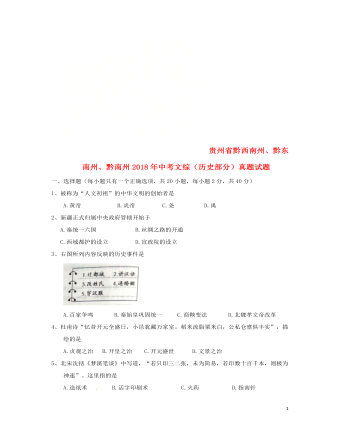
贵州省黔西南州、黔东南州、黔南州2018年中考文综(历史部分)真题试题(含答案)
材料一 每一(签暑国)政府各自保证对与各政府作战的三国同盟成员国及其附从者使用其全部资源,不论军事的或是经济的,联合起来,共同对敌……——1942年1月《联合国家宣言》材料二1954年,日内瓦国际会议上,美国国务卿杜勒斯严令美国代表团:不准任何人与中国代表握手……1972年2月,美国总统尼克松乘专机抵达北京,周恩来总理前往迎接周恩来对尼克松说:“你的手伸过世界最辽阔的海洋未和我握手一-25年没有交往了啊!”——摘编自尼克松回忆录《领导者》材料三 北京时间2018年3月23日,美国宣布将对600亿美元中国出口商品征收关税,并对中国实行贸易限制一一摘编自《中国网》(1)材料一所述《联合国家宣言》的发表,标志着什么组织的建立?(1分)美国和中国是否同属于“签署国”?(1分)
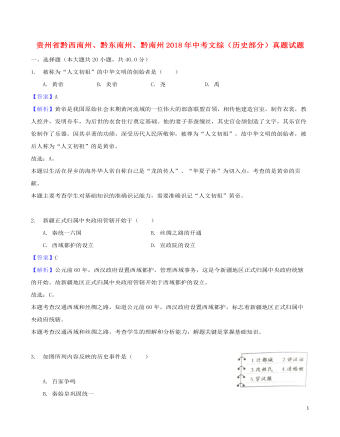
贵州省黔西南州、黔东南州、黔南州2018年中考文综(历史部分)真题试题(含解析)
材料一 每一(签暑国)政府各自保证对与各政府作战的三国同盟成员国及其附从者使用其全部资源,不论军事的或是经济的,联合起来,共同对敌……--1942年1月《联合国家宣言》材料二1954年,日内瓦国际会议上,美国国务卿杜勒斯严令美国代表团:不准任何人与中国代表握手……1972年2月,美国总统尼克松乘专机抵达北京,周恩来总理前往迎接周恩来对尼克松说:“你的手伸过世界最辽阔的海洋未和我握手一-25年没有交往了啊!”--摘编自尼克松回忆录《领导者》材料三 北京时间2018年3月23日,美国宣布将对600亿美元中国出口商品征收关税,并对中国实行贸易限制--摘编自《中国网》(1)材料一所述《联合国家宣言》的发表,标志着什么组织的建立?美国和中国是否同属于“签署国”?
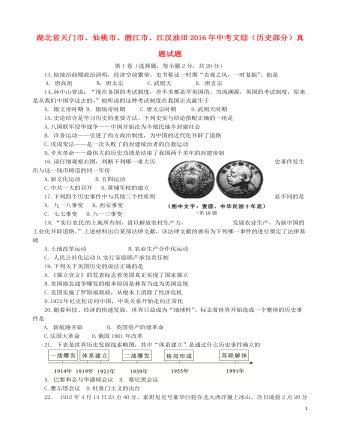
湖北省天门市、仙桃市、潜江市、江汉油田2016年中考文综(历史部分)真题试题(含答案)
日本是我国重要的邻国,请阅读下列材料并回答问题: 材料一(明治政府)于1870年设立工部省,聘请大批外国专家和技师,引进先进技术设备和管理方法,建立国营为主、铁路和矿业为重点的近代工矿企业,同时扶植、保护私人资本主义企业。1872年,解除买卖禁令,承认土地私有和买卖自由。——摘自人教版九年级《世界历史上册教师教学用书》 材料二(日本)20世纪50年代中期以后逐渐转向以购买专利为主来引进新兴技术;从70 年代中期开始又以引进尖端技术为主。日本经济在此期间得以高速发展,跃居为仅次于美国的第二位资本主义经济大国。——摘自人教版九年级《世界历史下册教师教学用书》 材料三日本是缺乏资源的国家,是用教育的作用开采人的脑力、心中的智慧资源和文化资源的。这是今天日本在经济上、社会上、文化上获得发展的原动力。——摘自人教版九年级《世界历史》(下册)教科书 ⑴根据材料一的内容并结合所学知识概括它反映的是明治维新中哪项具体改革措施?(2分)明治维新使日本强大起来后很快就走上了什么道路?(1分)
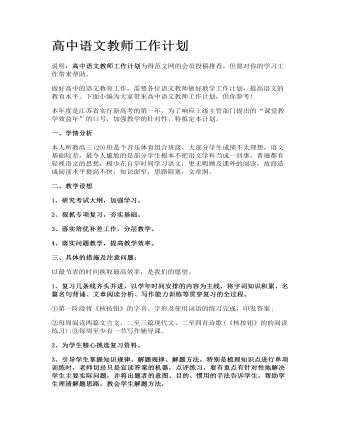
高中语文教师工作计划
二、教学设想1、研究考试大纲,加强学习。2、狠抓专项复习,夯实基础。3、落实培优补差工作,分层教学。4、落实问题教学,提高教学效率。
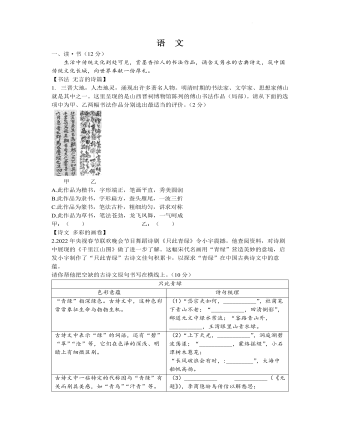
2022年山西省中考语文真题
王某曰:古之学者,虽问以口而其传以心虽听以耳而其受以意。故为师者不烦,而学者有得也。孔子曰:“不愤不启,不悱①不发,举一隅②不以三隅反,则不复也。”夫孔子岂敢爱其道,骜③天下之学者,而不使其蚤④有知乎!以谓其问之不切,则其听之不专;其思之不深,则其取之不固。不专不固,而可以入者,口耳而已矣。吾所以教者,非将善其口耳也。
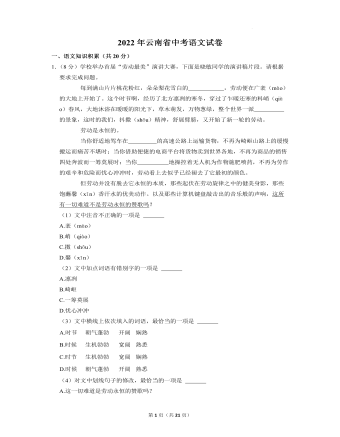
2022年云南省中考语文试卷
环滁皆山也。其西南诸峰,林壑尤美,望之蔚然而深秀者,琅琊也。山行六七里,渐闻水声潺潺,而泻出于两峰之间者,酿泉也。峰回路转,有亭翼然临于泉上者,醉翁亭也。作亭者谁?山之僧智仙也,名之者谁?太守自谓也。太守与客来饮于此,饮少辄醉,而年又最高,故自号曰醉翁也,醉翁之意不在酒,在乎山水之间也,山水之乐,得之心而寓之酒也。
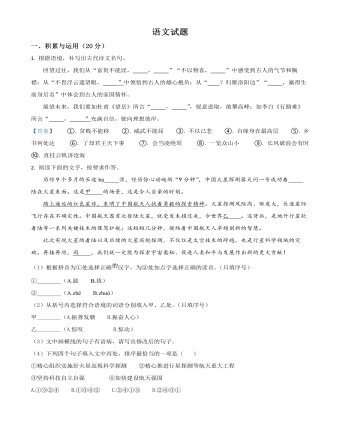
2021年福建省中考语文试题
终于,一块巨石立在我们面前。几个威严的大字,赫然入目:老山界。这里是1934年11月,红军长征经过惨烈的湘江之战后,翻越的第一座大山。当年翻越这座山的陆定一,记下了这段难忘的经历。于是,一篇美文《老山界》进入了共和国的中小学课本,激励着一代代国人在人生的道路上奋勇前行。为纪念革命先辈,为宣传红军精神,傍着这座山的东安、新宁、城步三地,都立有老山界的碑石。
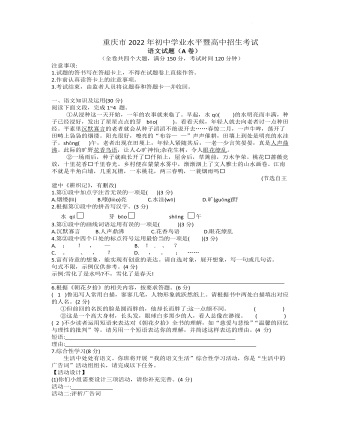
2022年重庆市中考语文A卷
这一天,阳光明亮,大鸟忽然觉得它的双脚可以抬起了。它十分激动地对冰山说:“我能飞了,我能飞了,我可以回家啦!”它扇动翅膀,飞了起来。可是,大鸟很快掉进了海水里。它好几天没吃东西,已经没有一丝力气。
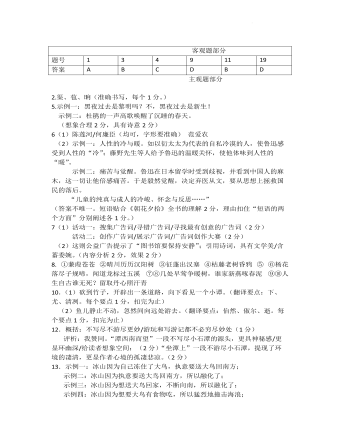
2022重庆中考语文A卷答案
作者通过举例,更具体地说明了“自下而上找结构”的方法;/作者分步骤,更为清晰地讲解了如何从庞杂信息中找到结构;/作者通过高度概括(提炼观点),使读者更为快速地了解从庞杂信息中找到结构的方法。
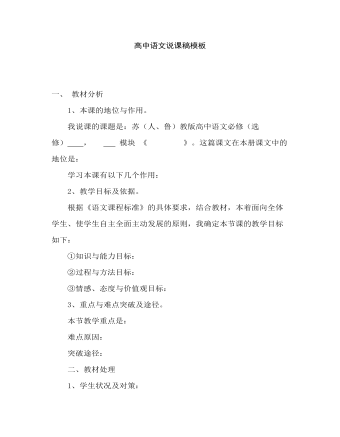
高中语文说课稿模板
2、教学目标及依据。 根据《语文课程标准》的具体要求,结合教材,本着面向全体学生、使学生自主全面主动发展的原则,我确定本节课的教学目标如下: ①知识与能力目标: ②过程与方法目标: ③情感、态度与价值观目标:
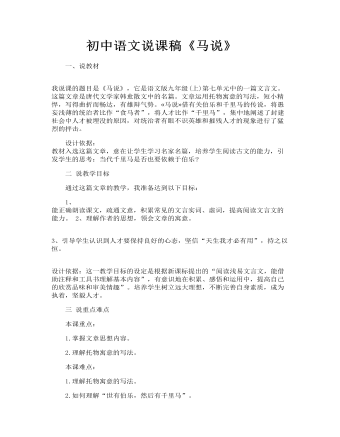
初中语文说课稿《马说》
二 说教学目标 通过这篇文章的教学,我准备达到以下目标: 1、 能正确朗读课文,疏通文意,积累常见的文言实词、虚词,提高阅读文言文的能力。 2、理解作者的思想,领会文章的寓意。 3、引导学生认识到人才要保持良好的心态,坚信“天生我才必有用”,持之以恒。 设计依据:这一教学目标的设定是根据新课标提出的“阅读浅易文言文,能借助注释和工具书理解基本内容”,有意识地在积累、感悟和运用中,提高自己的欣赏品味和审美情趣”。培养学生树立远大理想,不断完善自身素质,成为执着,坚毅人才。 三 说重点难点 本课重点: 1.掌握文章思想内容。 2.理解托物寓意的写法。 本课难点: 1.理解托物寓意的写法。 2.如何理解“世有伯乐,然后有千里马”。 四 说教法学法: 教法:诵读法、引导法。 学法: 自主、合作、探究式学习。 设计依据:诵读法是学习文言文的基本方法。同时,在课堂教学中,必须贯彻以学生为主体和教师为主导的教学原则,教师应引导并组织学生进行自主、合作、探究式的学习。